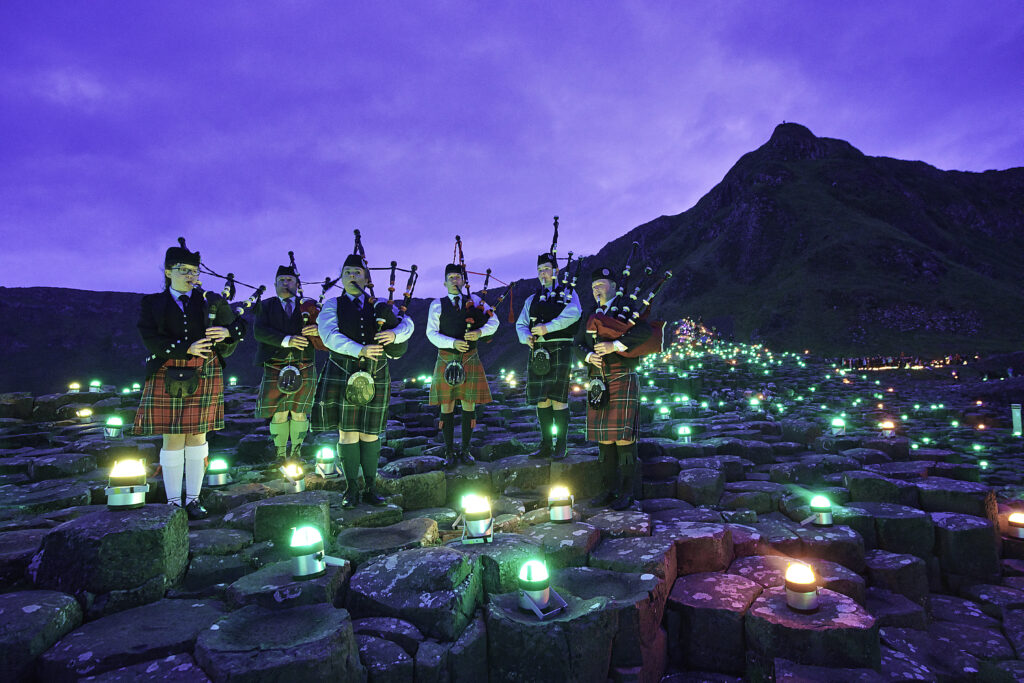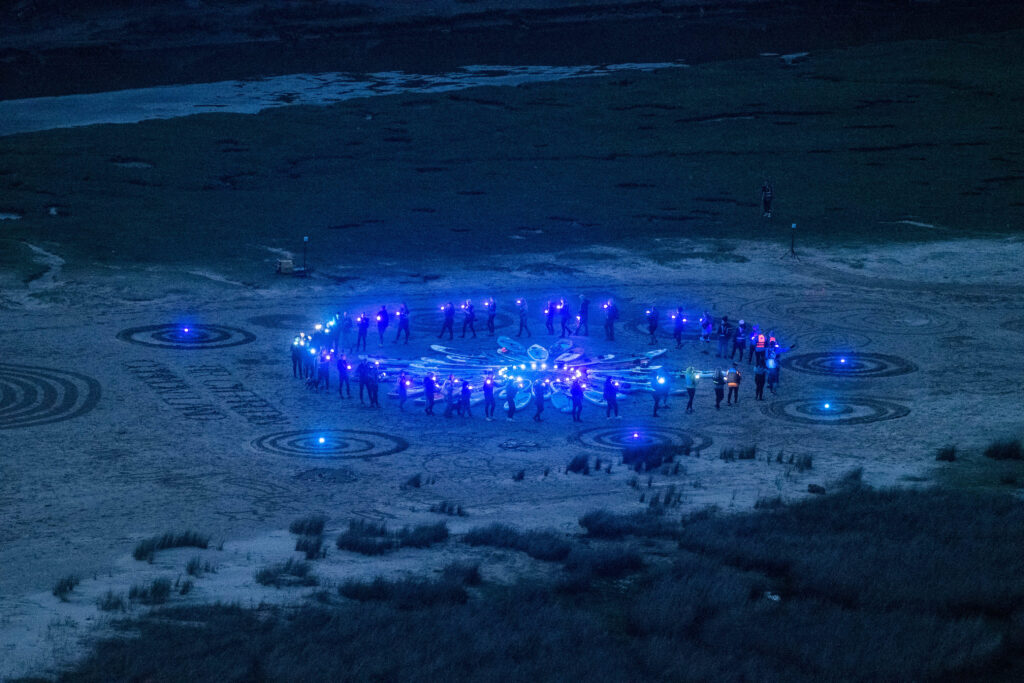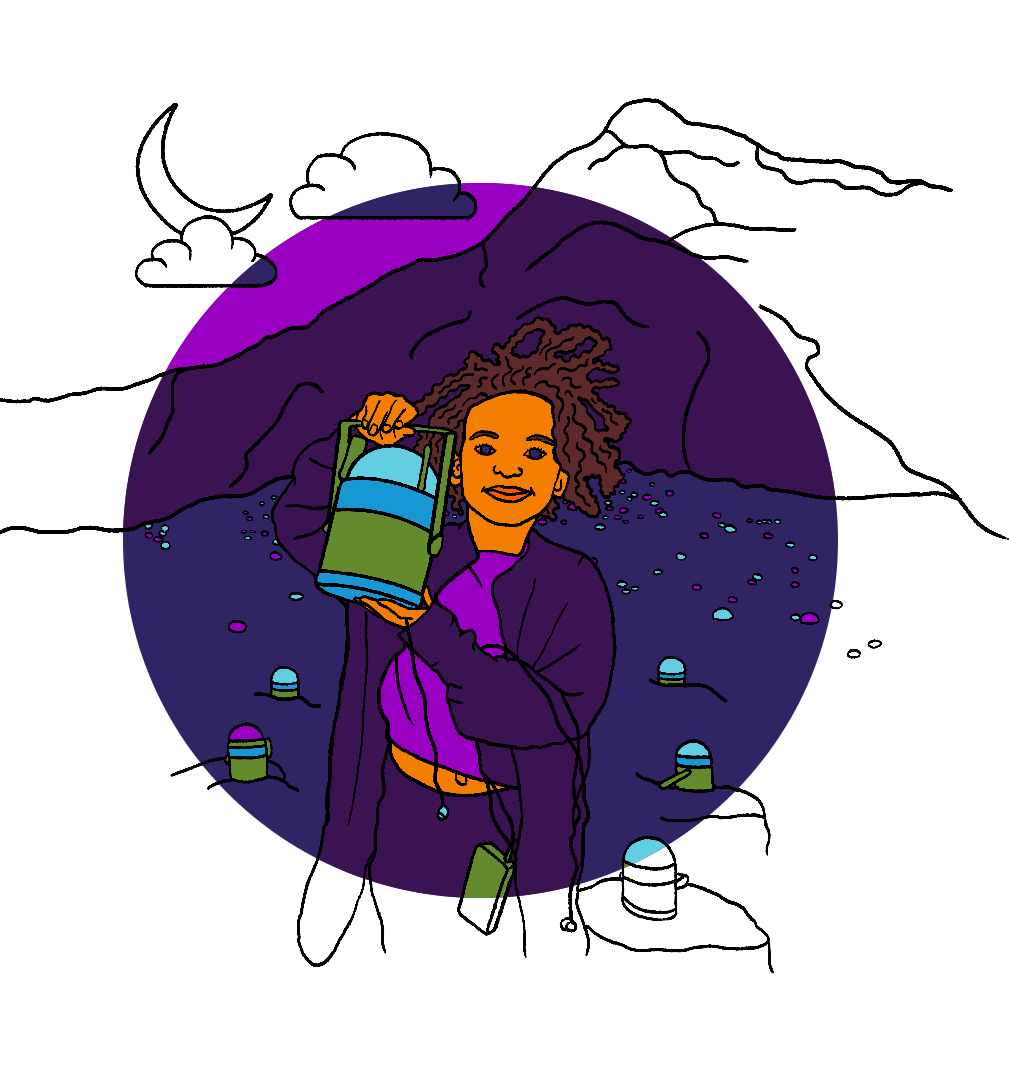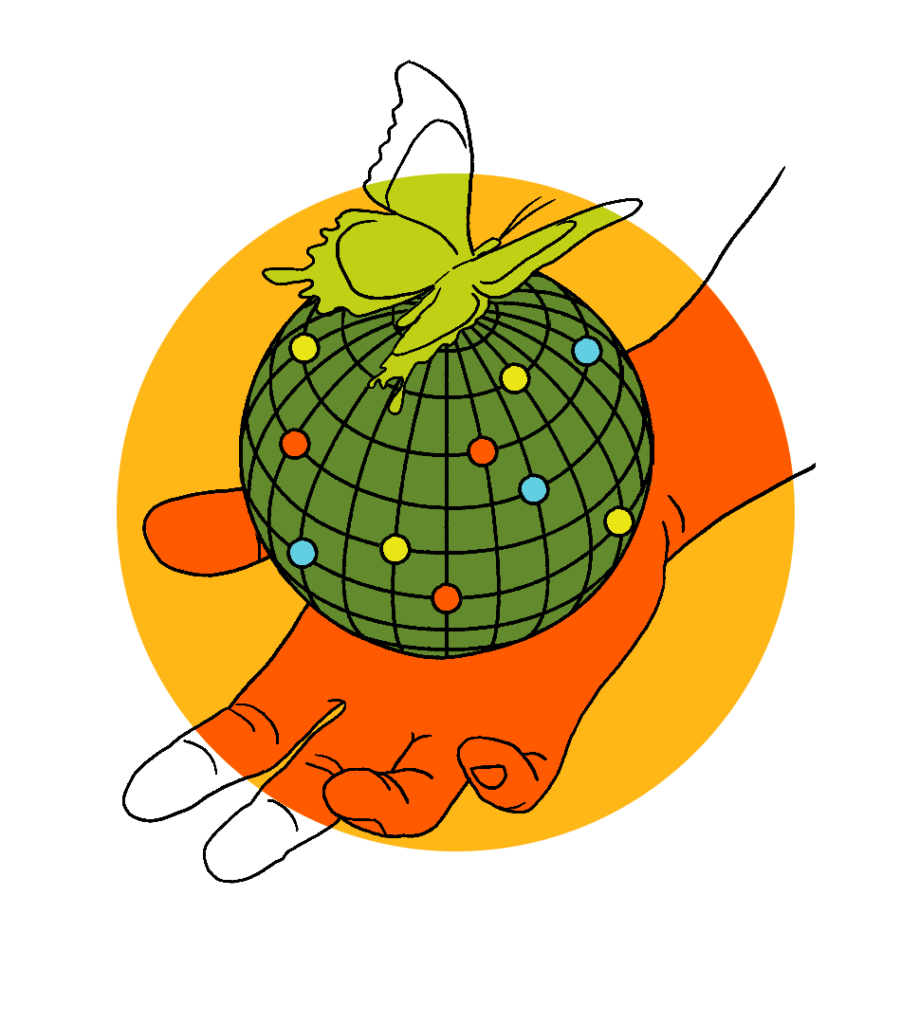For the past two years, a pioneering arts company has led a team of engineers, environmentalists and artists to shine a light onto our connections with the landscape and ask us all to become better guardians of nature.
Green Space Dark Skies is one of 10 groundbreaking commissions for UNBOXED: Creativity in the UK. It aims to connect people to the planet by offering diverse community groups a chance to explore the landscape on their doorstep through a journey at dusk into a National Park or an Area of Outstanding Natural Beauty (AONB). Each journey involves hundreds of people carrying special ‘geolights’ – geo-positioning lights powered through renewable energy. Events took place in 21 different locations across England, Scotland, Wales and Northern Ireland between April and September 2022, and each gathering was captured on film and shared online and through broadcast.
As co-founder for arts organisation Walk the Plank, one of the UK’s pioneers in participatory outdoor arts, I have been involved in shaping many spectacular celebrations that put communities at their heart while reinforcing a sense of place or time. This one is different.
Green Space Dark Skies was commissioned during the pandemic, and is very much of this time. The project was designed under lockdown, and none of the team who undertook the R&D met in person until the pitch had been successful and the planning phase had begun. The focus is on bringing people into a closer relationship with nature in order to build better guardians of the planet. At least 25% of those taking part have never been welcomed into the countryside before.
We offer a way to bring people into a connection with nature and with each other that provides a memorable, sensory experience
This is profoundly different from how the company worked before: no live audience, no spectacular show to wow them. Instead, we offer a way to bring people into a connection with nature and with each other that provides a memorable, sensory experience – one that is intimate, beautiful, and shaped by the composers, poets and artists who are part of a creative team recruited in each location.
And there’s an emphasis on minimising our carbon footprint in every decision we make, from the provision of public transport for all participants to the absence of generators and the use of renewable energy at all the sites.
In the project’s conception, we acknowledged the profound shift that had taken place as a result of the pandemic, when the privilege of travel was removed from us all and our only journeys were for essentials – for food, for work or for medical treatment. Research by National Parks UK revealed the socioeconomic and cultural barriers faced by many people in accessing the great outdoors, from a lack of public transport to a feeling of not being welcome because of how you are dressed or the colour of your skin.
In the nineteenth century, the Enclosures Acts in the UK removed lands held in common. 2022 was the 90th anniversary of the 1932 Kinder Scout Mass Trespass, a citizen protest that gave rise to the right to roam movement in the UK and the subsequent establishment of National Parks as places where we can all have access to the land. Who owns land matters; as Guy Shrubsole wrote in Who Owns England, ‘Land is by far the greatest of monopolies, and how the landowners use their land has implications for where we build the affordable housing we need, the food that we grow and how we grow it, and how much space we leave for nature.’ Perhaps we should not have been surprised that one of the challenges the project faced was gaining permissions from landowners!
This project wouldn’t have been possible without the investment in culture that Nesta’s Arts Impact Fund made in the company five years
ago, which enabled us to purchase an industrial space, Cobden Works. Alongside an Arts Council England capital grant, that investment gave the company a sustainable workshop space and HQ under one roof – a roof now adorned with solar panels so we can generate our own energy to recharge the geolights. It also gave us the security to weather the combined storms of Brexit and a global pandemic. This relative stability put us in a position to take advantage of the UNBOXED R&D callout for teams that brought together partners from science, technology, engineering, maths and the arts.
The cross-disciplinary nature of a project that involves young engineers from Siemens working alongside Walk the Plank’s creative technologists, artists and sustainability experts, in partnership with National Parks
UK, the National Association of AONBs and the University of Salford, is both challenging and exciting. Challenging because the new technology to control the lighting was developed in a very tight timescale; exciting because we are succeeding in building ‘nature connectedness’ in thousands of people. People who had never set foot in a National Park or AONB in their lives – but who have been made to feel welcome, who have discovered the health and wellbeing benefits of time spent in nature, and who are making plans to spend more time outdoors, with friends or family.
Professor Miles Richardson’s research identifies a correlation between a lack of ‘nature connectedness’ and a lack of biodiversity, placing the UK as bottom in a survey of 14 European countries in both metrics. He also identifies Senses, Emotion, Beauty, Meaning and Compassion as levers that might make change happen. Green Space Dark Skies offers people experiences that involve all of those levers.
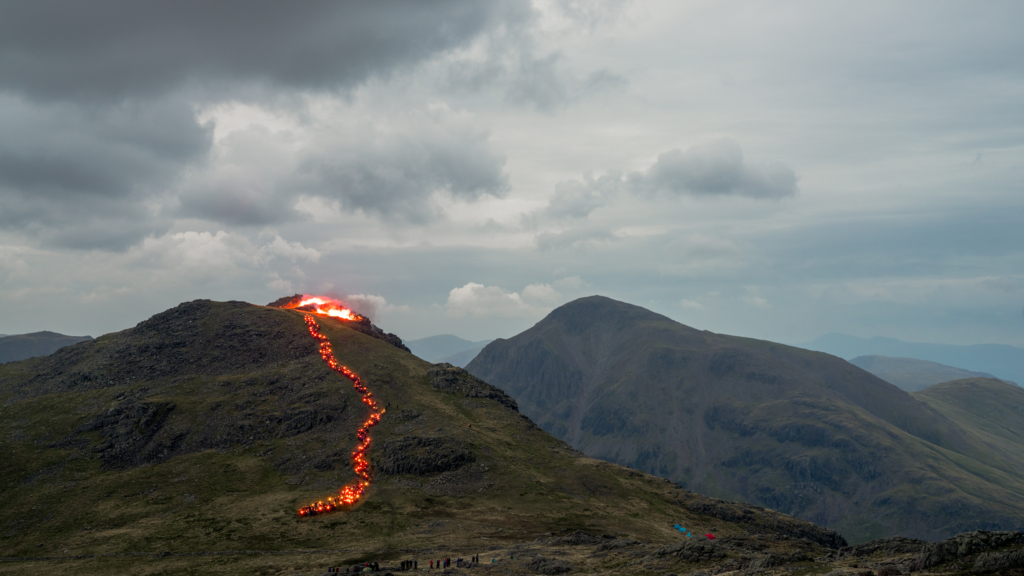
Here’s what some of our participants said:
‘I had an amazing time. I went on my own, met several people and had fun with the lights in such a beautiful location. A great experience.’
‘A stunning, life-affirming experience.’
‘Quite an emotional experience – thank you.’
‘Amazing. It was such a lovely thing to have been able to participate in.’
‘Mind blown at the #GreenSpaceDarkSkies event on Mynydd Parys last night…felt really privileged to be part of a mass gathering celebrating nature in natural landscapes. Proper magic.’
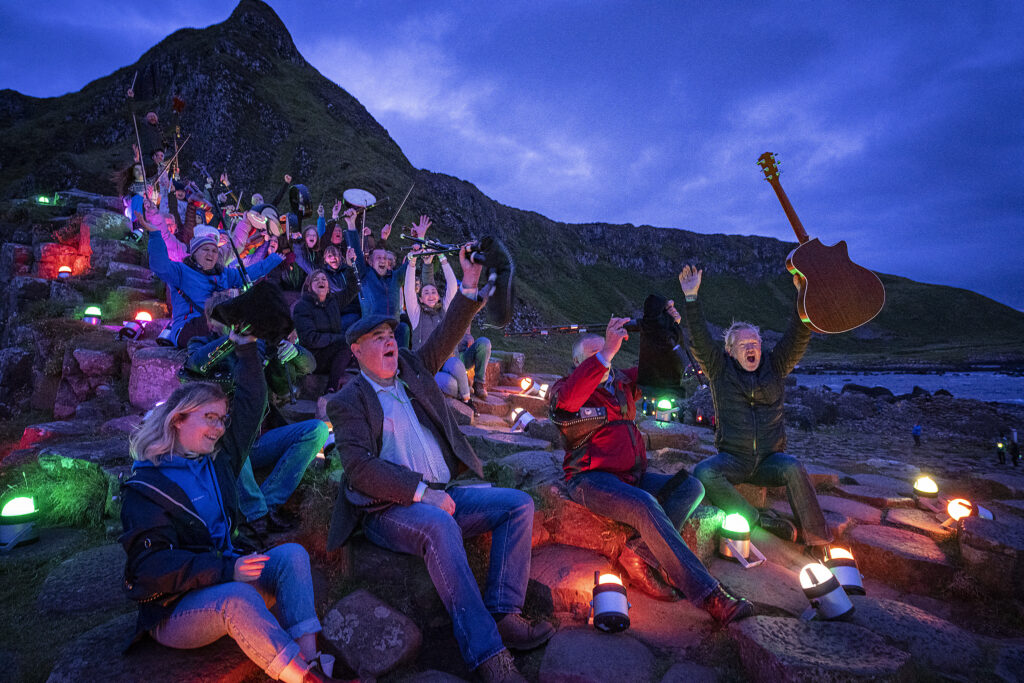
The legacy of Green Space Dark Skies will become clear over the next five years as the benefits of projects of this scale – requiring new ways of working and focused on interventions that bring new partners into sometimes uncomfortable proximity – are rarely visible immediately. But we can already see that the mycelium of artists, scientists and environmentalists interested in interdisciplinary work has been strengthened by the project as it has reached into corners of Wales, Scotland, Northern Ireland and England. We look forward to working with National Parks and other guardians of land to build more meaningful dialogue between people and place, nationally and internationally.
